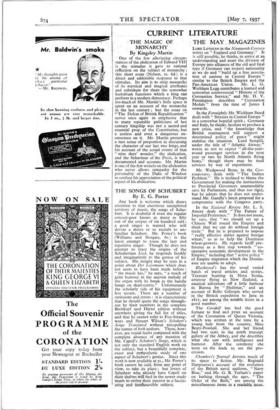Any book is welcome which draws attention to that enormous
unexplored territory of music the songs of Schu- bert. It is doubtful if even the regular concert-goer knows as many as fifty out of the corpus of six hundred odd ; a good singer is wanted who will devote a dozen or so recitals to un- familiar Schubert. Mr. Porter's book (Williams and Norgate, 6s.) is the latest attempt to rouse the lazy and repetitive singer. Though he does not attempt to trace the origins of the Schubertian Lied, he responds freshly and imaginatively to the genius of his subject. His insight may be seen in a point about Der Leiermann which does not seem to have been made before : "the music has," he says, "a touch of grim humour in the uneven melody of the organ with its break as the handle hangs on dead-centre." Unfortunately the scholarly side of his equipment is less secure. There are a number of omissions and errors : it is characteristic that he should quote the songs through- out by their numbers in the complete Breitkopf tmd Hartel edition without anywhere giving the full list of titles, and that he cannot refer to Fox-Strang- ways and Steuart Wilson's Schubert's Songs Translated without misspelling the names of both authors. These, how- ever, are venial faults compared with the complete absence of any mention of Mr. Capell's Schubert's Songs, which is not only the standard English work on the subject, but a beautifully complete, exact and - sydipathetic study of one aspect of Schubert's genius. Since this work is now available at 5s., Mr. Porter's book cannot be said, from any point of view; to-take. its place but lovers of Schubert who already have Capell on their shelves will find in the newer study much to revive their interest in a fascin- ating and inexhaustible subject.














































 Previous page
Previous page